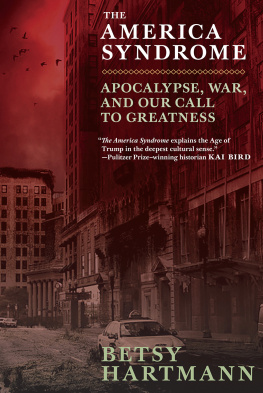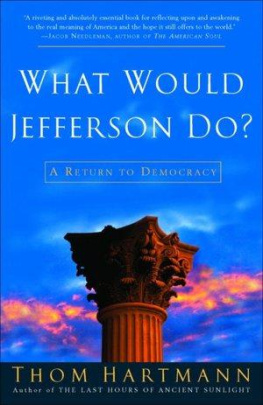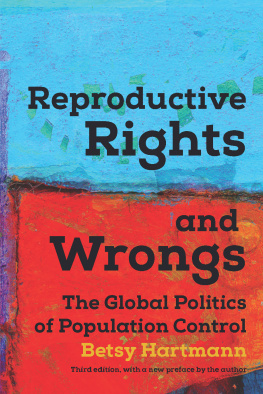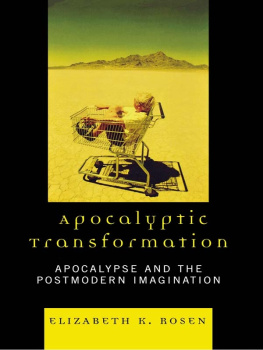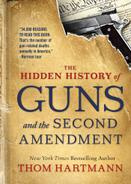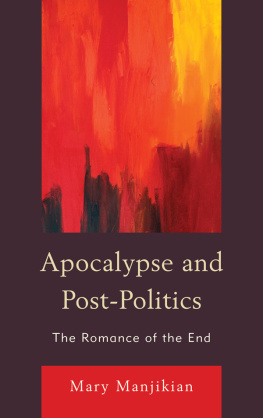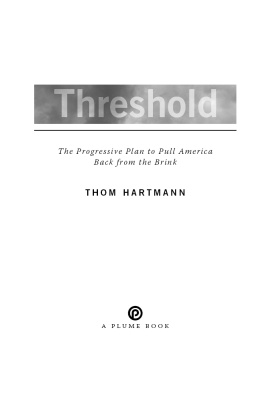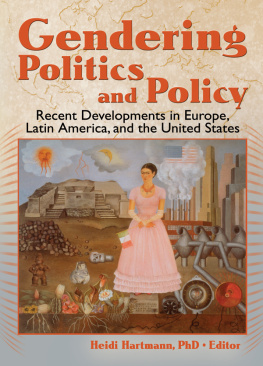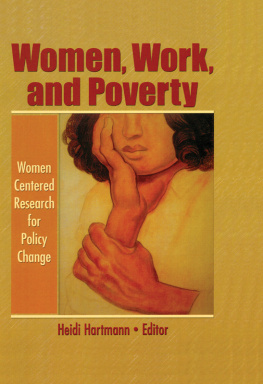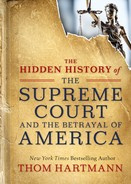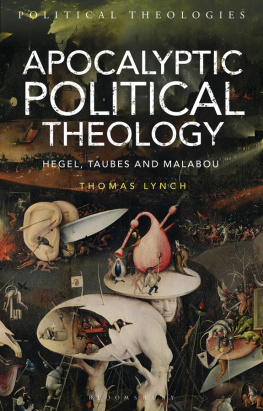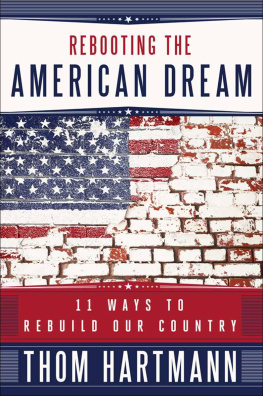All rights reserved. No part of this book may be reproduced, stored in a retrieval system, or transmitted in any form or by any means, including mechanical, electronic, photocopying, recording, or otherwise, without the prior written permission of the publisher.
Names: Hartmann, Betsy, author.
Title: The America syndrome : apocalypse, war and our call to greatness / Betsy Hartmann.
Description: New York : Seven Stories Press, 2017. | Includes bibliographical references and index.
Identifiers: LCCN 2016057014 (print) | LCCN 2017010548 (ebook) | ISBN
9781609807405 (hardback) | ISBN 9781609807412 (Ebook)
Subjects: LCSH: United States--Civilization--1970| Fear--United States. |
Crises--United States. | National characteristics, American. |
Exceptionalism--United States. | Social psychology--United States. |
BISAC: SOCIAL SCIENCE / Anthropology / Cultural. | SOCIAL SCIENCE /
Future
Studies.
Classification: lcc e169.12.h378 2017 (print) | lcc e169.12 (ebook) | ddc
973.92--dc23
LC record available at https://lccn.loc.gov/2016057014
Printed in the USA.
CONTENTS
Introduction
End Times and Endless War
Chapter One
The Puritans: Pride and
Prejudices of a Chosen People
Chapter Two
Utopian Dreams, Millennial Madness
Chapter Three
Boom and Doom: The Magic of the Atom
Chapter Four
The Church of Malthus
Chapter Five
Climate Change: Tip of the Melting Iceberg
An optimist isnt necessarily a blithe, slightly sappy whistler in the dark of our time. To be hopeful in bad times is not just foolishly romantic. It is based on the fact that human history is a history not only of cruelty but also of compassion, sacrifice, courage, kindness. What we choose to emphasize in this complex history will determine our lives. If we see only the worst, it destroys our capacity to do something. If we remember those times and placesand there are so manywhere people have behaved magnificently, this gives us the energy to act, and at least the possibility of sending this spinning top of a world in a different direction. And if we do act, in however small a way, we dont have to wait for some grand utopian future. The future is an infinite succession of presents, and to live now as we think human beings should live, in defiance of all that is bad around us, is itself a marvelous victory.
Howard Zinn, The Optimism of Uncertainty,
The Nation, September 2, 2004
ACKNOWLEDGMENTS
So many people have helped me in the process of writing this book that I worry, in my usual way, that I have left someone out. First, Id like to thank my agent and friend Rick Balkin who believed in the book since its inception. He went above and beyond the call of duty by casting his sharp editorial eye on drafts and keeping my spirits up whenever they lagged with his great sense of humor. Special thanks go to publisher and editor Dan Simon, assistant editor and publisher Lauren Hooker, marketing and publicity director Ruth Weiner, and their team at Seven Stories Press. Dans insightful comments helped me to see and shape the book in new ways, and it has been a pleasure to work with such a dedicated publisher.
For help in developing a deeper understanding of American history I am grateful to Susan Tracy, professor emerita of History and American Studies at Hampshire College, who kindly commented on numerous chapter drafts, lent me books and answered my questions. I just wish I could have put everything I learned from her into the book. Alan Hodder, professor of Comparative Religion at Hampshire, shed light on the Puritans and transcendentalism. I also owe a big debt of gratitude to two great scholars of American history: Paul Boyer and Sacvan Bercovitch, both of whom passed away recently. Their books inspired many of my thoughts, and I wish Id had the opportunity to thank them personally.
A number of colleagues, friends, and family members gave valuable feedback on the manuscript or parts of it. They include Sue Boyce, Axel Harneit-Sievers, Anne Hendrixson, Nick Hildyard, Peggy Hobbs, Katie McKay Bryson, Kathy Pfister, Rosalind Pollan, Jade Sasser, Sarah Sexton, and Banu Subramaniam. My previous work with Banu and Charles Zerner on our anthology Making Threats: Biofears and Environmental Anxieties helped lay the ground for this book. The population chapter benefitted from my long association with dedicated scholar/activists Mohan Rao and N.B. Sarojini in India, The Corner House in the UK, and Hampshire College colleagues Marlene Fried, Anne Hendrixson, and Kay Johnson. Through teaching together and through her books, Kay taught me so much about the tragic human consequences of Chinas one-child policy. Ongoing conversations with colleagues Michael Klare and Frank Holmquist and disasters expert Ben Wisner have deepened my knowledge of climate, security, and the African context. Lyla Mehta and Melissa Leach at the Institute of Development Studies and Jan Selby in the Department of International Relations at Sussex University in the UK have helped me sharpen my analysis of population, scarcity, and environmental security issues. Simon Dalby has also been an important influence on my thinking.
Hampshire College, from which I recently retired, has always been supportive of my research and writing, and I especially appreciate my colleagues in the School of Critical Social Inquiry, the Civil Liberties and Public Policy Program, and the Population and Development Program for all the help they have given me over the years. I also appreciate my students for keeping me on my toes and hopeful.
Geoffrey Boyce and Sarah Launius taught me a lot about border issues and activism, and Sonia Kruks introduced me to Simone de Beauvoirs views on political purity. Charles Mann provided me with new materials and insights on the history of apocalyptic thinking in environmentalism. Thanks to Amy Diehl for her help in website design.
A fellowship at the Mesa Refuge in Point Reyes, CA in the spring of 2012 allowed me the space to write the first draft of the climate chapter, and that same spring, thanks to Jade Sasser, I was able to workshop my chapter on the atomic bomb at the University of California, Berkeley, Workshop on Environmental Politics.
My mother-in-law Alice Boyce and four friends, Cliff Kuhn, Bill Howley, Sue Leather, and Robert Prasch, all of whom were inspiring thinkers and activists, died while I was writing this book and I hope it honors their legacy.
Many friends and family provided moral support, guidance, and a sounding board along the way. Special thanks to Rosette Gault, who has been there for me since the age of twelve and whose ideas spark my thinking, Corinne Demas, Kathy Pfister, Neil Stillings, Joyce Duncan, Sam Gladstone, Jennie Kitteringham, Ivan Nutbrown, Patty Mintz, Debbie Bernick, Doug and Jane Smith, Greg Lieberknecht, Matthew Roehrig, Jerry Epstein, Fran Deutsch, the members of my writing and political study groups, my father-in-law James E. Boyce, my sister Darcy Hartmann, my mother Martha Hartmann, and my children and their partners, Jamie Hartmann-Boyce and James Sinclair, and Tom Hartmann-Boyce and Melissa Arrambide. My first grandchild Alistair was born while I was writing this book and he has brought enough joy to brighten even the darkest day.

